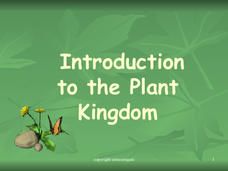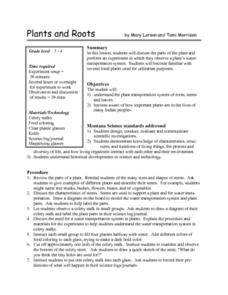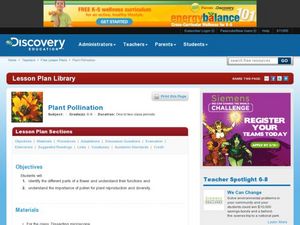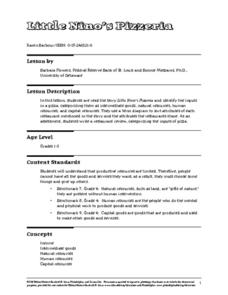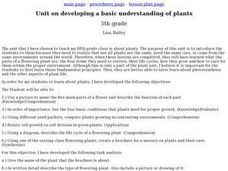Curated OER
Larva and Adult Antlion Body Parts
Students identify the major body segments of antlions. Through the use of diagram worksheets, students label the various body parts of the antlion. They review the life cycle of antlions from the larva stage to adult. Several activities...
Biology Junction
Introduction to the Plant Kingdom
Plants provide humans with food, shelter, and medications. Scholars gain a better appreciation for plants after learning their functions, divisions, and early ancestors. Each sub-topic includes slides highlighting vocabulary and...
Curated OER
Buddhism - Buddha Day, Make your own Origami Crane - Part 1
In this Origami crane worksheet, students create a crane to recognize Buddha Day. The visual art helps students illustrate their knowledge of the Buddhist religion.
Curated OER
Pollination
In this pollination worksheet, students read and assess comprehension. In this labeling and filling in the blanks worksheet, students answer fourteen questions.
Curated OER
Plant Pollination and Fertilization
Fourth graders research and apply knowledge about plant pollination and fertilization in this lesson. They color on a flower diagram the anther, the pistil, the pollen, the pollen tube, the ovary, and the egg to show the process of...
Curated OER
Plant Structure and Function
With a few minor formatting changes, the plant parts and processes resource here would make a great study guide, quiz, or self assessment. Currently, it is a bit confusing, but changing some lettering to numbering would clear up any...
Curated OER
Let's Learn About Plants!
Students discover different plants and plant parts by observing their campus. In this plant life lesson, students take a guided walk around their school with a magnifying glass examining everyday plants as well as photographing...
Houghton Mifflin Harcourt
That’s Amazing!: Challenge Activities (Theme 3)
Synonym dominoes, anyone? As part of the activities designed for kids who have mastered the basic concepts in the Houghton Mifflin Harcourt thematic unit That's Amazing! kids are offered a variety of activities that include...
American Museum of Natural History
Planetary Mysteries
Get to know our little part of the vast universe. Learners read about the common and not-so-common facts about each of the planets in the solar system. The interactive lesson includes a large amount of information as well as a quiz to...
Curated OER
Introduction To Floral Morphology
Students create a model of the four basic whorls of flowers using a water bottle, construction paper and Q-tips. They then examine fresh flower specimens to see how the basic structure can vary in different species of flowering plants.
Biology Junction
Introduction to Plants
In this biology lesson, students identify the different types and parts of the plant. They complete a crossword puzzle with 37 questions about plants.
Curated OER
Plants and Roots
Learners discuss the parts of the plant and
perform an experiment in which they observe a plant's water
transportation system. They become familiar with
several local plants used for utilitarian purposes.
Curated OER
Adverb or Adjective
Sixth graders choose adjectives to describe an object given by the teacher and share with the class, then do the same for a verb, choosing an adverb to modify each. In this adjective or adverb lesson, 6th graders review the difference...
Curated OER
Rainforest Plant or Animal?
Students explore the major functions of plants and animals. In this rainforest lesson plan students create a Venn diagram to compare and contrast animals in the rainforest.
Curated OER
Insects Are Helpful!
Students see that insects do lots good and are very valuable to humans and nature. This is part of an ongoing effort to dispel fears of insects. They rotate through a series of centers that have examples of how insects contribute to our...
Curated OER
Arthropod Mouth Parts and Food
Learners identify the different types of mouths arthropods have for eating various types of food. Given photographs of the different types of arthropods, students identify which mouth they have and what type of food they can eat with...
Curated OER
Plant Pollution
Students study the different parts of a flower and their functions. In this pollination activity students study a flower under a microscope.
Curated OER
Plants and Animals
Students find common needs between plants and animals. In this plants and animals instructional activity students compare that both plants and animals need food and water. They also find the differences between plant and animal needs.
Curated OER
Properties of Light
In this light spectrum worksheet, students will read a diagram and a chart listing information about the different types of light rays from Gamma rays to radio waves. Then students will write a short essay about a new life-form that...
Curated OER
Trait Variations for Survival
Young learners examine how different traits could give one organism an advantage over another. In groups, they view two different organisms in different environments. To end the lesson, they complete a Venn Diagram on the two organisms...
Curriculum Corner
Coniferous and Deciduous Trees
What are the differences between coniferous and deciduous trees? Supplement your tree lessons with a set of activities that has learners describing, naming, comparing, and reading about deciduous and coniferous trees. The activities are...
Federal Reserve Bank
Little Nino's Pizzeria
Engage your youngsters in basic economics by connecting the terms to dessert and pizza! After a discussion about intermediate goods and natural resources, learners read and connect a pizzeria to economic terms.
California Education Partners
Linflower Seeds
How does your garden grow? Use proportions to help Tim answer that question. By using their understanding of proportional relationships, pupils determine the number of seeds that will sprout. They create their own linear...
Curated OER
Unit on Developing a Basic Understanding of Plants
Fifth graders study the parts of a plant, their life cycles, and how to care for them in this unit.



